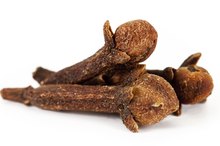Honey & Asthma
Asthma is a chronic condition that affects the airways in your lungs. During an asthma attack, the airways become inflamed and constricted, making it difficult to breathe normally. When you are exposed to certain triggers, symptoms like coughing, wheezing, and chest tightness result. Honey is a touted by ABC News as type of alternative treatment that can help relieve coughing. Honey should not, however, be your only source of asthma treatment.
Function
Honey can be used to treat coughing and the subsequent wheezing associated with asthma. According to ABC News, honey soothes the mucous membranes in your airways. Mucous accumulation in the bronchial tubes, better known as airway constriction, is one of the causes of asthma symptoms. ABC News reports that a study conducted by the Archives of Pediatrics and Adolescent Medicine revealed that honey is effective in treating night-time coughing in children. The same type of coughing is associated with asthma.
- Honey can be used to treat coughing and the subsequent wheezing associated with asthma.
Types
Chamomile & Honey Tea for Laryngitis
Learn More
It is important that you use the most effective type of honey to treat asthma. ABC News recommends using dark honeys like buckwheat honey, as they are the most effective in treating cough. Light honeys may still work, but do not contain as many antioxidants as dark honey. Honey can be purchased from your local grocery store or health foods store.
- It is important that you use the most effective type of honey to treat asthma.
- ABC News recommends using dark honeys like buckwheat honey, as they are the most effective in treating cough.
Indications
Consumer Health Digest recommends using a quarter teaspoon of honey at a time for the treatment of asthma and allergies. You can use it alone as often as needed. Also, you can add a quarter teaspoon to your favorite tea. The honey combined with the warm liquid enhances mucous removal from the bronchial tubes. ABC News reports that honey should not be given to infants due to the risk of botulism. Honey should only be used in people ages two and older.
- Consumer Health Digest recommends using a quarter teaspoon of honey at a time for the treatment of asthma and allergies.
Precautions
Drinking Milk & Honey as a Chest Decongestant
Learn More
Allergic asthmatics should be especially cautious when using honey as a cough treatment. According to Consumer Health Digest, honey can contain traces of pollen, a common allergen. Depending upon the severity of your allergies, even the smallest amounts of pollen can cause rashes, facial swelling, and eye irritation. The American Academy of Allergy Asthma and Immunology (AAAAI) states that pollen-laden products can also interfere with prescription diabetes medications.
- Allergic asthmatics should be especially cautious when using honey as a cough treatment.
- Depending upon the severity of your allergies, even the smallest amounts of pollen can cause rashes, facial swelling, and eye irritation.
Considerations
Honey may be beneficial to asthmatic children between the ages of two and six who contract a cold, as over-the-counter cough medicines are not recommended by the Food and Drug Administration for young children. Users should consult a doctor before using honey as a regular form of asthma treatment. While honey can help relieve coughing associated with asthma, recurring symptoms should be treated with a long-term controller medication that relieves airway inflammation.
Related Articles
References
- ABC News: Honey Treats Coughs Better than Drugs
- U.S. Department of Agriculture. Honey. FoodData Central. 2019.
- Cianciosi D, Forbes-Hernández TY, Afrin S, et al. Phenolic Compounds in Honey and Their Associated Health Benefits: A Review. Molecules. 2018;23(9):2322. doi:10.3390/molecules23092322
- Oduwole O, Udoh EE, Oyo-Ita A, Meremikwu MM. Honey for acute cough in children. Cochrane Database Syst Rev. 2018;4:CD007094. doi:10.1002/14651858.CD007094.pub5
- Pasupuleti VR, Sammugam L, Ramesh N, Gan SH. Honey, Propolis, and Royal Jelly: A Comprehensive Review of Their Biological Actions and Health Benefits. Oxid Med Cell Longev. 2017;2017:1259510. doi:10.1155/2017/1259510
- Aguiar R, Duarte FC, Mendes A, Bartolomé B, Barbosa MP. Anaphylaxis caused by honey: A case report. Asia Pac Allergy. 2017;7(1):48-50. doi:10.5415/apallergy.2017.7.1.48
- American Academy of Pediatrics. Botulism. HealthyChildren.org. Updated November 19, 2018.
- National Honey Board. Honey Varietals. 2020.
Writer Bio
Kristeen Cherney began writing healthy lifestyle and education articles in 2008. Since then, her work has appeared in various online publications, including Healthline.com, Ideallhealth.com and FindCollegeInfo.com. Cherney holds a Bachelor of Arts in communication from Florida Gulf Coast University and is currently pursuing a Master of Arts in English.









